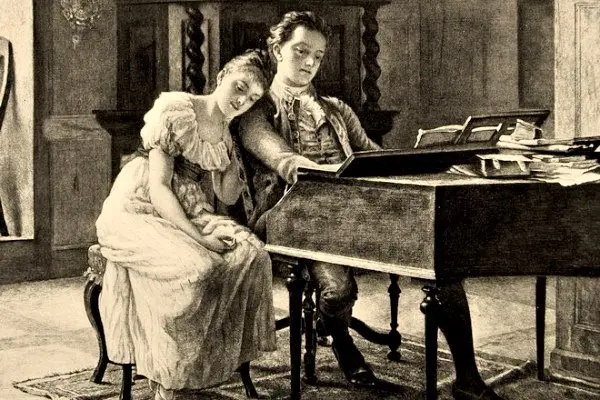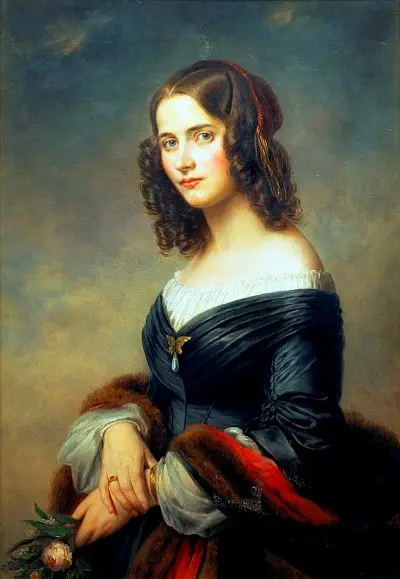Contents
😉 Hello dear readers! On the topic “Felix Mendelssohn: Biography” – information about the life of a German composer of Jewish origin. Most people know him as the author of the famous “Wedding March”. But the famous pianist, conductor and teacher was the author of many other works.
Mendelssohn-Bartholdy
Jacob Ludwig Felix was born on February 3, 1809 in Hamburg into the Jewish family of a wealthy banker Abraham Mendelssohn and his wife Leah. He was the second child of four children. In 1811 the family decided to renounce their religion and adopted Lutheranism.
This was a big blow to the father of Abraham Moses, who was a famous Jewish philosopher. The family took the surname Bartholdi and focused on the secular upbringing of their children. The family soon moved and settled in Berlin, partly out of precautions, as Abraham’s bank helped break Napoleon’s blockade.
The children in the family showed a keen interest in music from an early age. Felix and his older sister Fanny were passionate about music education. The piano was taught by Ludwig Berger.

Fanny and Felix
Later on the work of Felix was influenced by the famous composer Karl Friedrich Zelter. Many famous representatives of culture and art of that time often visited the Mendelssohn.
Young composer
As a schoolboy, Felix composed several works and made his Berlin debut at the age of nine. His sister Fanny also gained a reputation as a talented composer. But since a woman could not be a musician, she played only for friends in a home circle.
At the age of sixteen, Felix wrote his first major work – the string octet in E flat major. The well-known Midsummer Night’s Dream Overture followed in 1826. It marked the high point of his early career and is still considered one of his finest works by music researchers (the famous Wedding March).
It was during this period in the life of the young writer that they introduced the famous poet Johann Wolfgang von Goethe. Despite the age difference, they corresponded frequently. Subsequently, Goethe became one of Mendelssohn’s closest friends and inspirations.
Goethe was a great admirer of Mendelssohn, even compared him at this young age to Mozart. The feeling was mutual. Felix, in turn, wrote music for several of Goethe’s poems.
Passion according to Matthew
The twenty-year-old talented musician made his debut as a conductor at the Singakademie in Berlin with Bach’s St. Matthew Passion. The performance became the first performance of the work after the death of Bach. Mendelssohn created the arrangement for the performance and the reaction to his work was positive.
The conductor at this concert for the only time in his life publicly referred to his Jewish origin. He ironically noted that it is difficult for a Jew to be responsible for Christian topics. His difficult relationship with faith persisted throughout his life and literally “bleed” from time to time in his writings.
This was evident in an era when composers often wrote oratorios on the theme of Christianity alongside their secular works. When his mentor Zelter passed away in 1832, Mendelssohn tried to replace him as conductor of the Singakademie. However, Karl Friedrich Rungenhagen was appointed to this position.
It was rumored that his youth, interest in innovation, Jewish origin, or a combination of these factors were to blame. He temporarily moved to Düsseldorf, where he worked as the music director of the festival and participated in activities to improve local amateur performance.
However, his titanic efforts in this field were not crowned with success, and a disappointed Mendelssohn resigned in 1834. A year later, he took the prestigious position of conductor of the Leipzig Gewandhaus Orchestra.
Abraham Mendelssohn died in 1835. He really wanted his son to complete his first oratorio of St. Paul. Fulfilling the last wishes of his beloved father, Felix completed the work within a year and published it.
Cecil Genreno
During his stay in Frankfurt in 1837, he met Cecile Jeanrenot, the daughter of a French priest. Despite the age difference (Felix was ten years older), they got married. The happy married couple had five children.
During this period, Mendelssohn often traveled to England and Scotland. He first visited Britain in 1829, and these travels inspired him to create the Scottish Symphony. In 1843 he was introduced to Queen Victoria and Prince Albert and dedicated this symphony to the Queen.
The influence of the German composer on English music will remain significant for many years until a new generation of composers moves to a more modern and less sentimental and romantic direction.

Cecil Genreno
In Leipzig, Mendelssohn focused on creating a modern music center. He has worked with all creative and musical institutions. He organized festivals and concerts, which included performances of both contemporary music and works by famous composers.
Among the latter was Franz Schubert’s symphony, which had not previously been presented to the audience. The performance of the symphony led to a revival of interest in the works of the already deceased composer.
Leipzig – Berlin – Leipzig
Mendelssohn’s great achievement was the founding of the Leipzig Conservatory in 1843. Today it is called the Felix Mendelssohn Bartholdi Leipzig University of Music and Theater and has the status of the oldest university music school in Germany.
Frederick William IV ascended the throne in Prussia in 1840. The king was determined to turn Berlin into a cultural capital. To this end, he invited Mendelssohn, who for a long time did not dare to leave Leipzig.
The ruler managed to convince him. Mendelssohn moved to Berlin, where he created several excellent works. However, the king did not fulfill his promises about the title, funding and support of the music school. The composer returned to Leipzig a few years later.
In 1844, the famous soprano singer Jenny Lind was introduced to the famous musician, whom he became seriously interested in. He rewrote the aria especially for her voice in his oratorio Elijah. After his death, an unfinished opera for Jenny Lind was discovered among the papers.
They died in one year …
Mendelssohn returned from another tour of England tired and overworked. The death of his beloved sister in May 1847 dealt another blow to his health. He died in Leipzig on November 4, 1847, having outlived Fanny by six months. He was 38 years old!
Mendelssohn’s music, although somewhat conservative in nature, overcame the era of romanticism. A religious upbringing and a special interest in the technical aspects of music played a role in his musical style.
The composer often focused on revitalization rather than innovation, and ingeniously found ways to resolve some of the clashes between early classical and modern romantic styles.
His early works are considered to be his greatest legacy. Works, unusual for a musician of that era, brought him immortal fame.
Video
Additional information “Felix Mendelssohn: Biography” in the original submission. Be sure to take a look!
Felix Mendelssohn: biography ↓
😉 Dear readers, was this article helpful to you? Share Felix Mendelssohn: Biography with your friends on social media! Visit the site for new stories!









